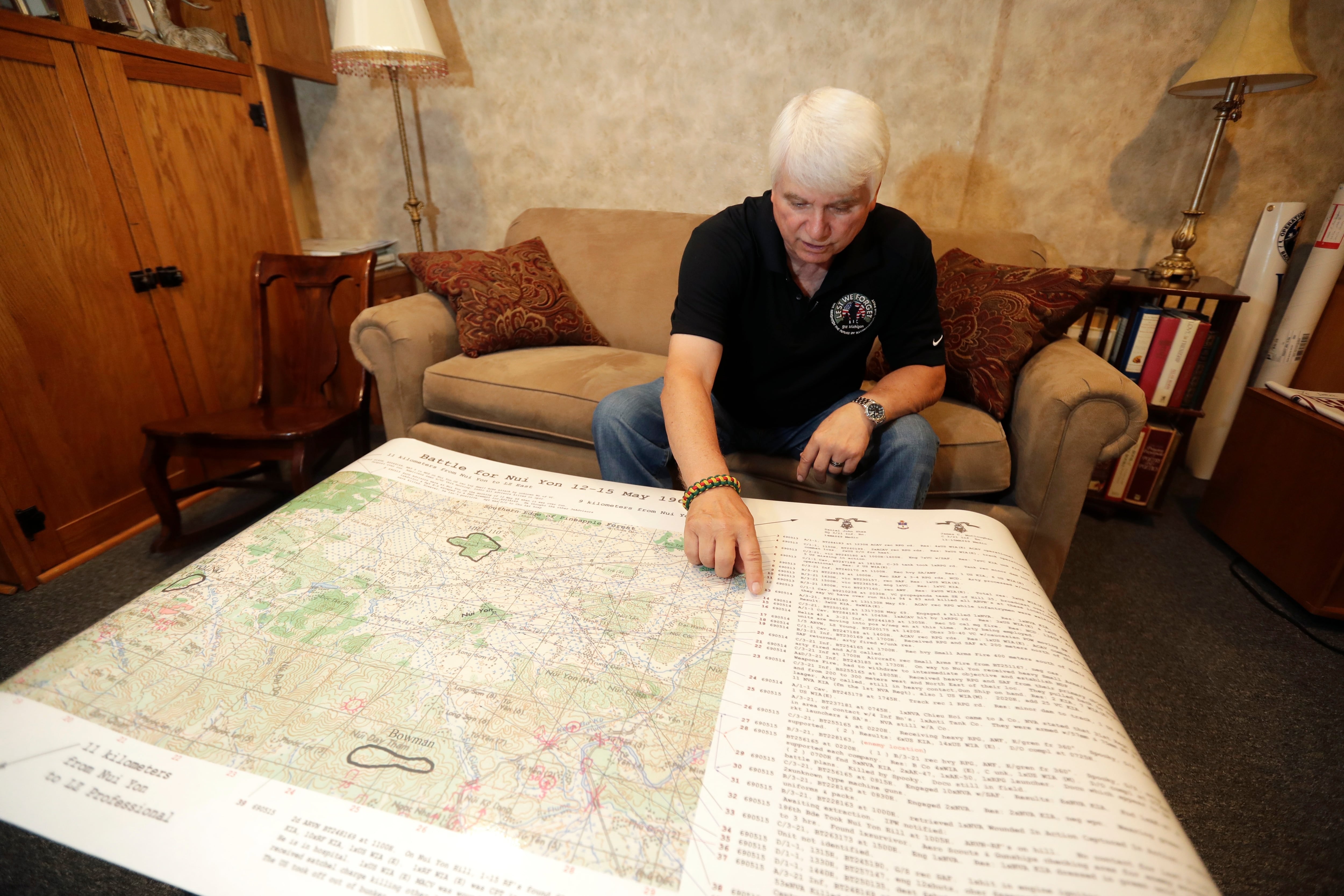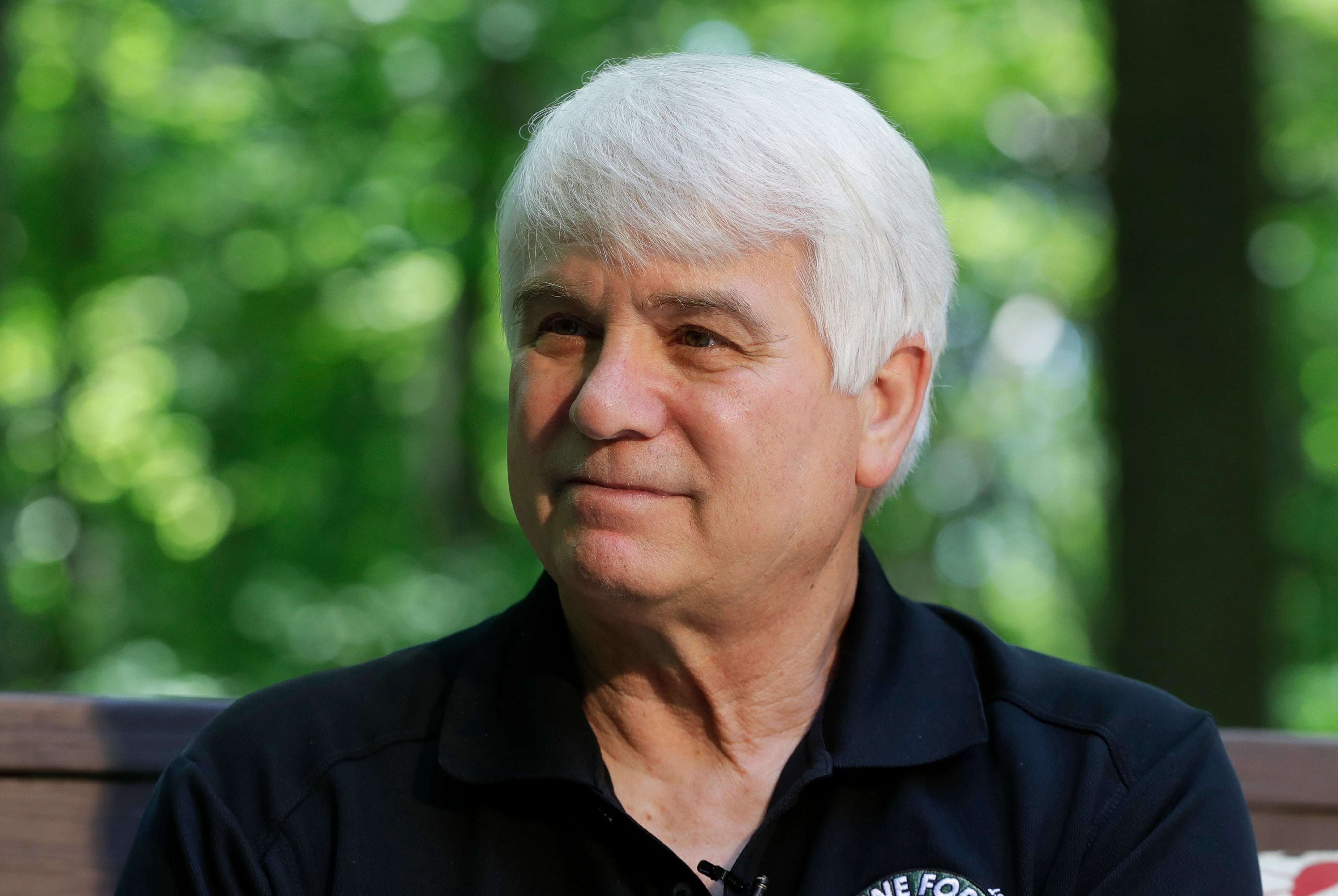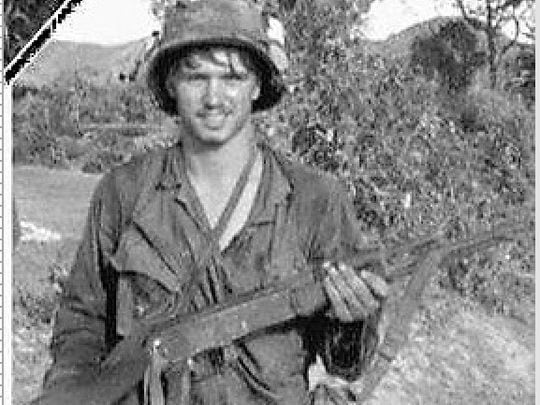When Former Spc. Jim McCloughan, 71, receives his Medal of Honor today, four battle buddies will be watching.
They fought with him side by side as draftees in in their early twenties, with C Company, 3rd Battalion, 21st Infantry, 196th Light Infantry Brigade Americal Division.
None thought they would live to talk about it, but more than 48 years later, the soldiers met up again in Washington, D.C., to tell the story of a nightmare Vietnam battle and honor the combat medic who got them through it.
“It’s almost sort of revisiting the past that I had, successfully, I should say, put off in the corner,” former Cpl. Kent Nielsen told reporters on Saturday.
Nielsen had only had limited interactions with his company’s medic before that fateful couple of days.
Their first formal meeting, he said, was soon after Nielsen had been shot in the first hours of a May 13, 1969, assault near Tam Ky, as C Company came under small arms and machine fire from the North Vietnamese Army.
“We had no idea how many of the enemy were in there,” McCloughan said. ”They had sent no forward observers. We had no idea what kind of fire power we were up against.”
It turned out to be 89 American troops versus 2000 North Vietnamese soldiers.
RELATED

Nielsen had been moving through crossfire, and so wasn’t sure whether he’d been hit by a North Vietnamese soldier or one of his fellow Americans.
“I reassured him and I showed him why he got hit by the enemy,” McCloughan said. ”His exit wound was the size of a quarter. If that had been an American M16, the hole would have been [the size of a grapefruit].“
“I cannot tell you the relief on that man’s face when he heard that he was hit by the enemy instead of his own men.“
The situation became even more dire that day when two helicopters trying to insert troops were shot down, one near the company’s position.
A squad was sent to guard the crew and prepare for a Chinook to lift the wreckage, but enemy fire was so strong that the pilot and soldiers inside had to be brought back to the company area.
Former Sgt. Bill Arnold had smashed his knee tumbling out of a helicopter, and after trying to run and fight on his wounded leg, he began to go into shock.
McCloughan found him lying on the ground.
“He came down, he threw me over his shoulder and he said, ‘Hang on for a bumpy ride,’ ” Arnold said.
McCloughan carried Arnold 100 meters through an open field as both American and North Vietnamese Army bullets whizzed by, according to the official battle narrative.
Later on May 13, according to the narrative, McCloughan dragged two wounded soldiers out of harm’s way and into a trench, as a rocket-propelled grenade peppered his back with shrapnel.
He did that four more times to extract wounded troops. One of them had such a severe stomach wound that his organs were threatening to spill out, so McCloughan applied pressure bandages.
He realized he couldn’t just throw him over his shoulder, so “I carried him like a baby through the crossfire,” McCloughan said.
As he ran into the kill zone, former Sgt. Joe Middendorf provided covering fire.
“They were really close,” Middendorf said of the Vietnamese troops.
Close enough that McCloughan could hear them speaking to each other, the former medic added.
“I’m sitting here because they couldn’t get a good shot at me, and they couldn’t get a good shot at me because of Sgt. Middendorf,” he said.
The worst day, until the next day
The fighting raged on through the night, Nielsen said, as he lied powerless on the ground and contemplated the worst.
“I’ll never forget: I spent the rest of that evening and night as an observer, witness, and a very concerned patient,” he said. “There were times during the night where I was desperately afraid we were getting overrun. I don’t know you’ve done in your life, but the closest to that was sitting there thinking, well if that grizzly bear comes over here, how do I pretend to be dead?”
McCloughan spent that night tending to the wounded because it was too dangerous to land a medevac. When one did arrive, McCloughan still stayed with the company.
“When that helicopter pulled out, the word around the company was, ‘Save one for yourself,’ ” former Sgt. Mike Martino said. ”Because we knew we were not going to get out. We were going to be overrun. We didn’t have enough ammunition to deal with it.”
In the morning, after wounded troops were successfully flown out, 1st platoon made the move to Nui Yon Hill.
The assault lasted all day, as enemy soldiers ambushed the troops, claiming the life of the company’s only other medic.
“I said this is the worst day of my life,” Martino said, remembering Day One of the battle.
That night, a helicopter came to drop ammunition down to the soldiers.
“But this guy is laying out there in the middle of this opening, while this fire is going on, holding a strobe light,” Martino said of McCloughan.
The medic crawled out into a rice paddy with the light, trying to signal to the helicopter.
“The door gunner never kicked anything out, he was so panicked by what was going on, he strafed our perimeter with the M60 [machine gun],” said former Sgt. Mike Martino, who found a hole from one of the bullets in his pant leg the next day.
The following morning, while fighting back enemies and keeping two critically wounded soldiers alive, McCloughan managed to knock out an RPG position with a hand grenade.
When the fighting subsided the morning of May 15, McCloughan had saved 10 lives, according to the narrative.
“I had nothing to drink in those 48 hours, I had nothing to eat,” he said. “The only thing I did with my water was to make sure that those bandages on that stomach wound stayed moist so that his organs would not dry out and he would die.”
’They don’t like to hear it’
Within a matter of months, all five men were back on American soil and processing out of the Army, off to rejoin society with 9-to-5 jobs.
McCloughan picked up where he left off, becoming a high school teacher and athletic coach in South Haven, Michigan.
But the memories of May 1968 stayed locked up tight, as they did for his battle buddies.
When asked how often he’d recounted what happened: “I wouldn’t say never,” McCloughan said.
“You pick and choose special situations, where you can only talk about it with those who know what you’re talking about,“ he said.
In 2012, McCloughan read an obituary for Martino’s mother, and decided to reach out to his old sergeant, who had settled down in New York state.
But Martino didn’t want anything to do with revisiting the war.
“I told him when he came through and visited me, that I would rather give you a kidney than revisit this,” Martino said.
Martino’s father, a World War II veteran, had told him it was best to keep it to himself.
“He said to me one time, he said, ’Michael, people will be polite, but they don’t really want to hear. It makes them uncomfortable, so just don’t talk about it,’ ” Martino said.
That was until they found out ”Doc“ would be receiving a Medal of Honor.
Now, the men said, they were reliving what they went through to support him.
RELATED

“Part of that is, you have to tell it because you have to say, I guess that really did happen,” McCloughan said. ”It’s surreal. It’s just like this medal.”
Meghann Myers is the Pentagon bureau chief at Military Times. She covers operations, policy, personnel, leadership and other issues affecting service members.




